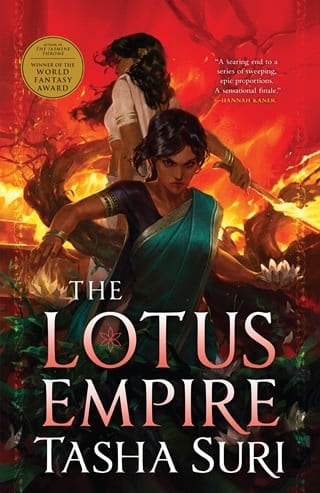Chapter 41 Priya
PRIYA
Priya grasped part of Ganam’s torn tunic and pressed a hand hard to his wound, staunching the blood.
“Shit,” he said, his voice shaken. Light was returning to his eyes, but his skin was still horribly dull. “I thought I was dead.”
“So did I.” She swallowed. She wasn’t trembling, but she felt as if she should be.
“That weapon,” he rasped. “It—did something to me.”
“It would be better not to speak of it to anyone,” Priya said. “We need to leave. Can you stand?”
“I’m not sure.”
She lifted him up a little; he groaned. He was heavy in her arms.
He’d been alone when she’d found him. He shouldn’t have been alone. The vastness of her new power yawned open. She reached for it.
She found her warriors— sensed them through the green, their heartbeats and their footsteps—and ripped a path through the green to lead them to her. Come , she called, and the green beckoned them: rot-riven plants turning their vines and their leaves, trees bending with the pressure of her command.
It shouldn’t have been so easy. She’d marveled at the paths Mani Ara had created through her, that labyrinth spiraling across Parijatdvipa from the bower of bones. But this came to her with savage ease. She wanted the path, and there it was. It was simple, now that her mind understood what it was to be a yaksa.
A moment passed, and the Ahiranyi warriors emerged in a group.
She turned her head to look at them. She didn’t know what expression she wore, but the warriors went very still.
“Where were you all?” Priya asked.
A long silence.
“ Speak ,” she demanded. The ground trembled faintly.
Shyam stepped forward, standing tall, arms behind him. Ready to take a blow.
“We were fighting the Parijatdvipan soldiers,” Shyam said. “When Ganam drew their attention and led them away, we couldn’t follow.”
“You’d be surprised,” Ganam said with difficulty, a grimace of a grin on his mouth, “what a few bushes of thorns will do to slow them down.”
“I’ll need to train them harder,” Priya said.
“I led the Saketans away,” Ganam said, breathing heavily. “When I realized what their weapons could do.”
Priya looked at her warriors again. Ruchi was bleeding from her arm. Her eyes were glassy with pain. The broken waters should have healed her. They hadn’t.
Priya could guess what kind of knife had carved her.
Her gaze dropped to the dagger she’d pulled free from Ganam’s skin, lying on the ground near them.
The blade was wet with Ganam’s blood, but even through the sheen of viscera, Priya could see the black stone of the blade.
She crouched on her palms and peered closely at it. The stone almost seemed to swallow the light.
She looked away from it.
“We’re returning to Ahiranya.”
“We haven’t found the sleeping yaksa,” Ruchi said in a thin voice, her eyes fervent despite her blood loss—or perhaps because of it. “We can’t simply leave.”
“We can,” snapped Priya. “Ganam is injured.” And I have power I never had before. And the empire has a weapon we can’t fight. Too many things have changed, and I won’t risk you all. “Help me with Ganam. I must see the yaksa.”
They rushed over to pick him up.
They were carrying Ganam toward the new path. They weren’t looking at her.
Her hand was still wrapped in Ganam’s torn tunic, wet with blood. She bit down on her own tongue, wrapped her hand tighter, and picked up the blade that had stabbed him and taken his strength away.
It was, in a way, no different from handling sacred wood. Although it did not burn, as sacred wood could, its coldness was a different kind of fire—a numbness against the skin. The cloth provided a barrier to its power, but an imperfect one. Even through cloth, it cleared Mani Ara’s memories from her head like dissipating smoke—and left her weak and trembling on the dirt, more human than she’d been in a long time.
But the new path would get them home. She didn’t need her strength right now. What she needed was to keep this weapon—this thing that could negate a yaksa’s power—close, until she could work out how to use it to her own ends.
She tucked the weapon into her kameez. Then she stood and followed them.
She could feel the yaksa waiting for her on the Hirana. Priya, at the end of the seeker’s path beneath the bower of bones, looked at her warriors and decided the yaksa could wait a little longer.
“Go,” she said to the warriors. “Take Ganam to the sickroom, and Ruchi too. I’ll be there soon.”
“Where are you going?” Ganam asked.
“To the Hirana,” she said. “I’ll talk to the yaksa alone.”
When the warriors had left her, she buried the knife. She didn’t know what purpose it would serve yet—she didn’t know if she would speak of it to the yaksa. They’d been dismissive of mothers’ fire, but this —this was an unknown.
She climbed the Hirana, stone melding together beneath her feet, all its rough edges, its carvings, turning to steps beneath her, making her ascent smooth.
In the triveni, open to the sky, the yaksa waited. Priya kneeled smoothly in front of them.
“We fought the Parijatdvipans,” Priya said evenly, her head lowered. “They ambushed us. In the process, your only twice-born elder, Ganam, was injured. A warrior who drank the deathless waters broken from the source was injured, too. But the Parijatdvipans are dead, and I will return to Srugna to save your sleeping kin. I will be there when they awaken. The fault was all mine, but I can fix it, and I will. If anyone has to be punished it’s me.” She raised her head, steeling herself for their cruelty and disapproval.
That was when she saw the smiles on their mouths.
“Oh, look at you,” breathed Sanjana. She drew Priya to her, fingernails sharp. “You carved a path. You brought yourself home.”
“You killed so many men, and so swiftly,” Bhisa Ara said. She sounded proud. Pleased. “Finally. You grow stronger.”
“Of course war is a good medicine,” Avan Ara piped up. “War and cruelty.”
“Mani Ara will want you,” Bhisa Ara said. They were speaking over each other so swiftly, a song like birds. “You must go to her.”
“I’ll seek her in the sangam,” Priya said, hoping she could grasp a little time before she sought out the first yaksa again.
“You must seek her near the deathless waters,” urged Vata Ara. “You will be closest to her there, in body and in your soul.”
What could she do? They were watching her with such hunger.
“Yes, yaksa,” she said. “Of course.”
She entered a prayer room alone. She kneeled and covered her face with one hand. She was still stained in blood and dirt, so tired she could have cried, but her life wasn’t her own. She had her orders.
She opened the way down to the deathless waters.
The light was, at least, oddly soothing. Blue reflected on the walls, a deep luster emanating from the waters themselves. She breathed in the scent of the waters: sweet flowers, petrichor. Salt.
With a breath, she entered the sangam. Within it she saw the same light, but stronger, colder—the stuff made of distant stars, stitched into the water and the rippling mirror of a sky above her.
“Sapling.”
She did not see Mani Ara in the water until Mani Ara had risen from it and pressed her cold, wood-whorled hands against Priya’s jaw.
Priya saw, for a dizzying moment, through Mani Ara’s eyes—her own shadow flesh, starlight-flecked; her own mortality. For a moment she was not simply Priya. She was more, vast. She was Mani Ara.
“Wh-what,” Priya gasped, not able to quite form a question.
“We are becoming one, sapling,” said the yaksa, joy rich in her voice. “My magic to your hollowness. Your heart to my ancient cruelty. Your natural belonging to the world and flesh, to my cosmic nature, my roots and green.” She was still holding Priya. “You have fought and grown,” she said. “Soon you will be strong enough to hold me.”
“You told me you wouldn’t erase me,” Priya said, shaky. Struggling to comprehend it. “That you wouldn’t turn me into a shell.”
“There are many things that are green and living, that belong to your world, that can only exist because their life is twined with another life,” Mani Ara said. “Think of the banyans of your forest, sapling. How one being grows upon another, and together they make a great life.”
Sapling. She was a plant, a seed, a tree that could act as Mani Ara’s host—the living, breathing bones that would allow her to slip into the world and grow from Priya’s skin.
Was that what the not-rot upon Priya was? Her sap-heavy blood, and the flowers at her collarbones—the flecks of green at her eyes. Were they all Mani Ara slowly eking out her space, her presence in Priya’s flesh?
“You have not been destroyed,” said Mani Ara, tenderly clasping Priya’s face, hair, skull—as if she could reshape her gently. As if she already had. “You will never be destroyed. You are a precious thing. You are my beloved, carved and hollowed for me. So slow you’ve grown, but now you’re close. So close.”
“Was I so difficult to create?” Priya asked. “Am I such a rare thing?”
“So many of you burned,” Mani Ara murmured. “Poor children. Nothing but husks.” Mani Ara’s hands released her. “The last one who was anything akin to what you are to me burned in mothers’ fire too,” Mani Ara said.
“I am surprised you don’t lock me away, if I’m so precious,” said Priya.
“How will you grow strong if I do so? It was only fighting and suffering in Srugna that allowed you to become so much more mine—so utterly complete.”
Panic was clawing up in her.
“How long until I am ready?” Priya asked, voice shaking.
“A few spans of days,” said Mani Ara sweetly. “Sunrises and sunsets, and you will be fit for me. And we will be one and yet not. Two halves.”
“One half eclipsing the other,” whispered Priya. “We won’t be equals, will we?”
“I am your god, sapling. Is that answer enough?”
It was in a way. It was.
“Look,” Mani Ara urged. “Look at the water.”
Priya lowered her head and looked.
The water beneath them, for a breath, stilled. And Priya saw one reflection in the water—one being, bigger than either of them. Her face, wrought strange, with a skin of bark whorled with stars; one mortal eye and another of flowers. Mortal skin at the throat and the shoulders, then a riot of flowers again at the heart. As she watched, it rippled and changed—flesh, to flowers, to utter cosmic starlight.
It was awful, and it was beautiful.
“What do I want you to do, sapling? Where must you go?” Mani Ara urged.
And for a single span of a heartbeat, a blink of an eye, she knew Mani Ara as she knew herself.
“Our children sleep in the earth,” said Priya. She raised her head. She filled her voice with determination. “I need to wake them up. One, and two, and then I need to return to you and become whole.”
Mani Ara smiled.
“Yes, sapling,” she said. “Just so.”
Maybe love and grief were light and shadow, and Priya a sundial. That must have been so, because the first thing she did when she returned to her skin was seek out Arahli Ara. He was alone, thankfully.
“Will Mani Ara wear my skin?” Priya asked. “Will she take it from me? Does she lie when she says we’ll share ?”
His body went—still. She hadn’t known how much the yaksa moved—how their leaves swayed and vines rustled—until they stopped.
“Your skin is your own,” he said. “You live inside it.”
“You knew then,” Priya said dully. She wanted to look at his face. Read his expression. But what use would that be, when he only wore something like a face? Could she read the leaves gilding his skull—the inky waters of his eyes? Was there language in them, just like there was in a smile, a tight jaw, a crinkled eye?
He was not Ashok. He was not hers to read.
“Do not think she does it lightly. It was a sacrifice to make us part of this world,” he told her. “A… I cannot describe it. Your mortal tongue has no words.” A pause. “A wrenching,” he said finally. “We were creatures of stars. Then we were not. It was enough, until we burned. When we were dirt and wood. Unable to die and unable to truly live.
“We become more human because it is a sacrifice. It is one that allows us to survive, even after what the mothers’ fire did to us. It allows us to come back. But it hurts us, Priya,” he said. “It hurts her to become you, as it hurts you to become her. But she does it so she may walk the soil and lead us. So we may all survive and bring your Age of Flowers again.”
“The way you wear the skins of my temple siblings—”
“We are not as old as her, or as powerful.” A strange tight smile, drawing his mouth, and joyless. “Our burden is lighter.”
“You told me you’re not my brother,” she managed to say.
“He is like a limb I have lost,” he said. “I feel him, even though he is not there. His absence is language. Maybe I grieve him.”
One vessel. An image—a memory—ran through her, bled its color behind her eyes. That ever-changing body Mani Ara had shown her. The way the world had shifted already. Rot making it flesh and green, and humans the same, and all of it full of magic.
The yaksa were shaping the world for them, as best as they could.
“You will live, Priya,” Arahli Ara said. “You will live with her. As all the green sings and moves, so you will sing and move.”
The world would become forests of rot. People of green. The yaksa would be flesh and green, and they would rule it all. Only the most blessed people, and the chosen, would be allowed to continue to live with the rot inside them. The rest would die, cut through with flowers. It wouldn’t be a world that belonged to humanity anymore.
The world Priya had known would end.
And Priya wouldn’t be here to see it. Priya would be a hollow shell, a carapace of meat for Mani Ara to wear, to bloom within, to rule from. Arahli could say she would live, but that didn’t make it true. She’d felt what it was like when she really, truly let Mani Ara in. The yaksa’s magic and memories were overwhelming.
Mani Ara wouldn’t love the people she loved. Mani Ara wouldn’t care about the Ahiranyi. She wouldn’t protect the temple children. She wouldn’t tell Padma nonsense stories until she slept.
She would let Ahiranya die, as surely as Parijatdvipa would. Because Ahiranya was not the glory of the Age of Flowers, or worshipping the yaksa, or the magic of the deathless waters, or temple elders standing on the triveni under a blanket of stars. Ahiranya was its people. It was the life they’d cobbled together and the culture they had built after the yaksa had first died. It was the love they had for one another. It was Ashok’s ruthless determination, and Bhumika’s steadfast cunning, and Sima’s practical kindness. It was scraps of the Birch Bark Mantras, and the crush of people in the market, and family, and the love and duty that bound them.
It wasn’t anything a yaksa could understand.
She couldn’t let the yaksa win. But she couldn’t let them lose, either. Both roads led to the obliteration of the Ahiranyi.
There had to be a third way. And if there wasn’t, she was going to make one.
She nodded, and breathed, and reminded herself she was still human. For however long she had, she was still that. And that meant there was still hope.
“Priya,” Arahli Ara said softly. “What will you do now?”
“What Mani Ara has willed,” Priya said. “It’s time for me to seek her children out once more.”
That night, when she dreamt, she thought of it. A third path.
In the twilight of sleep, in the darkness where she dreamt and Mani Ara couldn’t quite touch her, where a cord bound Priya to Malini, and Malini to Priya in return—she carved a path. A way. A welcome.
Come and find me, Malini.
If you want me, I’m yours.
 Fullepub
Fullepub 



